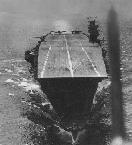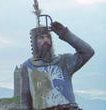mdiehl
Posts: 5998
Joined: 10/21/2000
Status: offline

|
M-T, *many* would agree with you about the superiority of the IJN in night actions in 1942. I'm the sort who looks at the data, though, and decides that Morrison's 40 year old perspective on the thing is inaccurate.
Most of the IJN superiority at night is based, as far as I can tell, on differences in doctrine (younger USN skippers and some CA admirals seem to have had a very different battle doctrine than older USN admirals, concerning the position of DDs with respect to the gun-line, whereas most IJN DD and CA admirals were of similar mind as the US DD skippers, probably because many IJN CAs had torpedoes), and on the selective reading of battles around Guadalcanal.
When you look at the battles around the 'canal you find that the Japanese achieved complete tactical surprise during the Savo Island battle, and did extremely well in the Cape Esperence battle by virtue of their torpedoes (which were notably ineffective at the 2nd Guadalcanal). In the other battles, the IJN piled on the errors. In three or four of the 'canal battles, as far as ship logs go it seems the US spotted the Japanese first.. twice by radar and once visually.
So count Savo as an IJN victory by virtue of tactical surprise. Count Esperence as an IJN victory by virtue of first-shots with torpedoes, but add a big asterisk: the US DDs at Esperence were in perfect range to use their torpedoes, had the IJN CAs in sight, and had not been spotted. Had *they* shot (been allowed to shoot, they requested permission to fire and were refused) first then the prevailing wisdom would probably dictate that the US were superior in execution despite their recent conversion to better doctrine.
Count 1st Guadalcanal as a US tactical and strategic victory (Henderson was *not* shelled). Count 2nd Guadalcanal as a clear cut 1-sided US victory, and while you are at it, make a note about the incompetence of IJN scout pilots for counting two US South-Dakota class BBs as 2 heavy cruisers. Make a note that in either of the two Naval Battles of 'canal, had the IJN concentrated their forces and thrown more into the effort (in light of the obvious presence of US capital ships in the area) they might have won either. Make a note that the US sank more tonnage of ships around the canal, and make a note that the IJN achieved none of their strategic goals in that campaign except their final one (evacuation of ground troops).
As to Balikpapan: I'm not inclined to give the IJN the benefit of the doubt. They thought that several US DDs at 800-1300 yards were a Dutch submarine out-to-sea. That fact does not say much about the consistency of IJN night optics, their ability to react to unforeseen circumstances, or the universal competence of their TF commanders. By the way, the DDs and a CL were in harbor with steam up, they sortied *looking for a submarine* after the US attack, after mistaking the results of the US attack for a submarine attack. They'd had reports of Dutch submarines in the area, and in typical IJN fashion assumed they had the complete tactical intelligence picture and did not bother with even the most elementary recon. Had the USN made such an error all would decry it as something like "typical early war US tactical bungling."
Bottom line for me: in the air and on the sea the Japanese were masters at the execution of set-piece engagements, and their strategic and operational planning through March 1942 was outstanding. The Japanese were great when everything went according to plan and by the book. Faced, however, with unusually stiff resistence, or unforeseen circumstances, they could almost always be counted on to screw up and badly.
I don't know how you'd factor that into a game. The US seemed on the whole to be somewhat better at achieving surprise than the Empire, at concentrating sufficient forces for the job at hand, at recon, at coordinating combat air patrols on CVs and at airbases, at fighter direction (both stunk at the latter two at Coral Sea... the US had made substantial improvements by Midway and continued to improve, the IJN did not.
It is really interesting as Begerud has pointed out that a culture that eschews individualism in favor of subordination to the group and higher authority produced fighter pilots and junior army commanders who viewed themselves as individual swordsmen, whereas a culture that elevates individualism had a combat doctrine that emphasized group coordination and ultimately produced some of the most effective fighting teams (in a/c, in naval squadrons, and to a mixed degree in land combat) in the world.
[This message has been edited by mdiehl (edited February 12, 2001).]
_____________________________
Show me a fellow who rejects statistical analysis a priori and I'll show you a fellow who has no knowledge of statistics.
Didn't we have this conversation already?
|
 Printable Version
Printable Version











 New Messages
New Messages No New Messages
No New Messages Hot Topic w/ New Messages
Hot Topic w/ New Messages Hot Topic w/o New Messages
Hot Topic w/o New Messages Locked w/ New Messages
Locked w/ New Messages Locked w/o New Messages
Locked w/o New Messages Post New Thread
Post New Thread